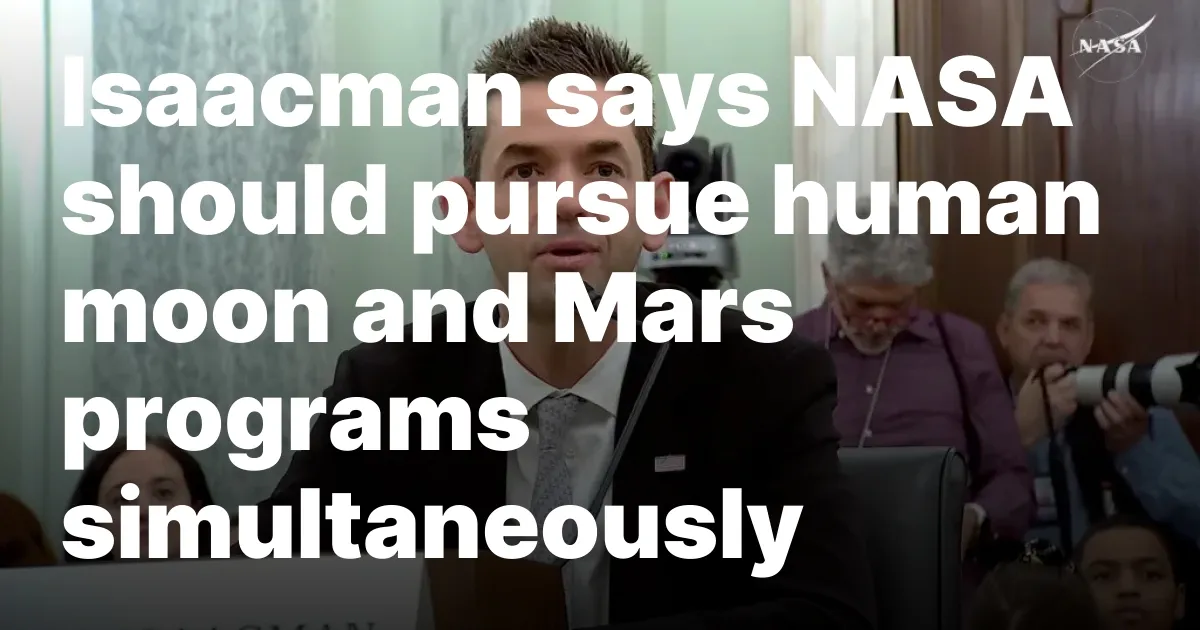
During a recent confirmation hearing held by the Senate Commerce Committee on April 9, Jared Isaacman, nominated by the White House to lead NASA, made a bold statement advocating for the agency to pursue both a human return to the moon and crewed missions to Mars. This stance comes in light of concerns raised by senators regarding the potential for the U.S. to fall behind in the new space race, particularly against China.
Senator Ted Cruz (R-Texas), chairman of the committee, opened the hearing by emphasizing the importance of maintaining focus on the ongoing Artemis lunar exploration campaign. He warned that any drastic shift in priorities could lead to a "red moon," indicating a loss of dominance to China in space exploration for generations. Isaacman responded by asserting that NASA can effectively pursue both the Artemis program and human missions to Mars, stating, “We don’t have to make a binary decision of moon versus Mars.”
Isaacman elaborated on his vision, insisting that NASA could manage these ambitious goals concurrently. “We could be paralleling these efforts and doing the near-impossible,” he claimed. Although he did not provide specific details on how a human Mars program could run in parallel with the Artemis initiative, he reiterated his commitment to returning humans to the moon before China's anticipated lunar return by 2030.
In a response to inquiries from Senator Jerry Moran (R-Kan.), Isaacman expressed his support for continuing key elements of the Artemis program, including the Space Launch System, Orion spacecraft, and the lunar Gateway. “This is the current plan. I do believe it is the best and fastest way to get there,” he stated, while acknowledging that it may not be the long-term solution for frequent travel to and from the moon and Mars.
Isaacman also addressed the future of the International Space Station (ISS), affirming his support for its operation until its planned retirement in 2030. He emphasized the need for a continuous U.S. human presence in low Earth orbit as NASA transitions to commercial space stations. This topic became contentious following remarks by Elon Musk, CEO of SpaceX, suggesting that the ISS should be deorbited. Isaacman stated, “I do not believe we should deorbit it now,” highlighting the value of the ISS in microgravity research.
Isaacman’s ties to Musk, as he commanded two SpaceX Crew Dragon missions, were also scrutinized during the hearing. He assured Senator Gary Peters (D-Mich.) that he had not engaged in any discussions with Musk regarding NASA matters since his nomination. However, he was less forthcoming about Musk’s influence on his nomination process, focusing on his direct interactions with President Trump instead.
Isaacman’s nomination has garnered significant backing from the space industry, with a letter of endorsement signed by executives from two dozen space companies highlighting his business acumen and ability to bridge collaboration between NASA and the commercial space sector. “Jared Isaacman represents precisely the type of leadership NASA needs in this critical era,” the letter stated.
Among those eager for Isaacman’s confirmation is Janet Petro, the acting NASA administrator. She expressed her anticipation for a positive outcome from the confirmation process, noting that the agency has been in a holding pattern without a confirmed leader. “Once we have an administrator and we get our budget from the White House, we can start looking at any changes in priorities,” Petro stated, reflecting the urgency for decisive leadership at NASA.
As the space exploration landscape evolves, Isaacman’s vision for a dual-focused NASA could play a crucial role in maintaining U.S. leadership in space. The outcome of his confirmation process may set the tone for the future of both lunar and Martian exploration.